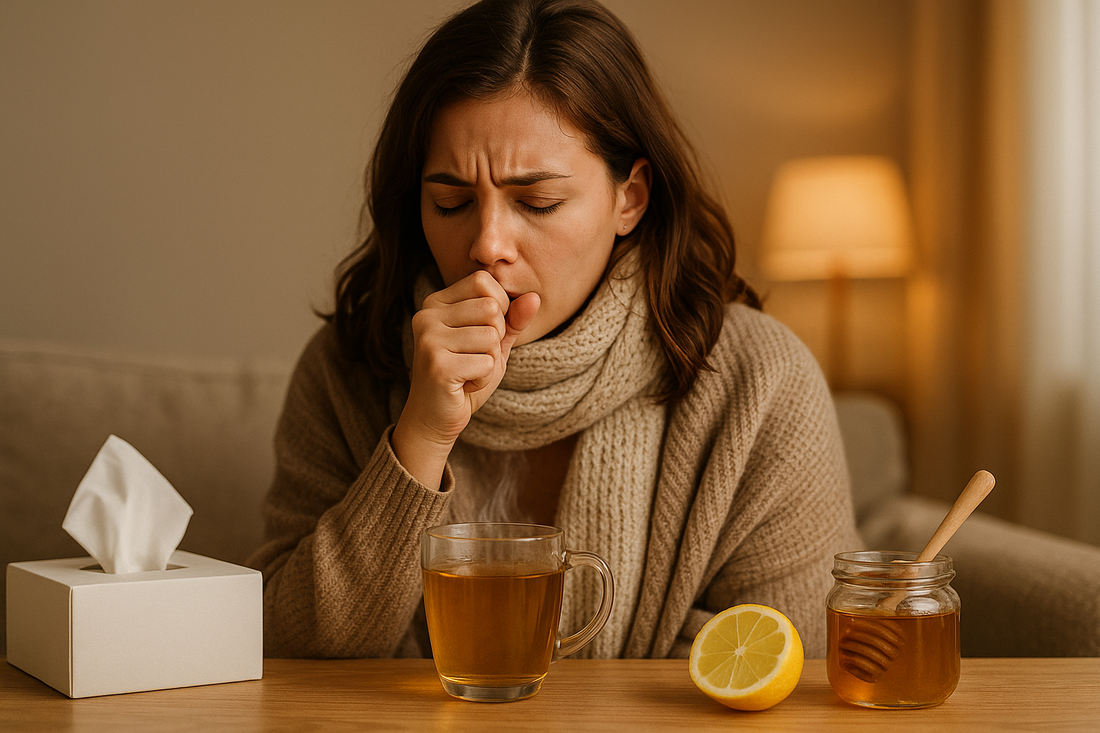
Cough: Ayurvedic Perspective, Remedies & Prevention
Share
Cough is one of the most common complaints in everyday life. Almost everyone experiences it at some point, whether due to seasonal changes, allergies, or infections. From an Ayurvedic perspective, cough isn’t just a symptom; it is a signal from the body indicating an imbalance in the doshas, especially Kapha and sometimes Vata. Understanding its causes, symptoms, and natural remedies can help you manage it effectively without relying heavily on modern medications.
What is Cough?
Cough is a natural reflex of the body to clear the respiratory tract of irritants, mucus, or foreign particles. While occasional cough is normal, persistent or severe cough can indicate underlying health issues. Ayurveda views cough not just as a physical reaction but as a manifestation of doshic imbalance.
- Kapha-related cough: Usually wet, with mucus or phlegm. Accompanied by heaviness in the chest.
- Vata-related cough: Often dry, tickling, or spasmodic. Can lead to throat irritation and hoarseness.
- Pitta-related cough: Rare but may occur due to inflammation in the respiratory tract, burning sensation, or throat irritation.
Common Causes of Cough (Ayurvedic View)
Ayurveda identifies several reasons for cough, which are often linked to lifestyle, seasonal changes, and food habits:
- Excess Kapha accumulation: Caused by cold, oily, or heavy foods. Leads to mucus production.
- Respiratory infections: Viral or bacterial infections disturb dosha balance.
- Allergies: Dust, pollen, or smoke can trigger cough.
- Weak digestion: Poor Agni (digestive fire) can lead to toxins (Ama) forming, aggravating the throat and lungs.
- Exposure to cold air or sudden weather changes: Can trigger Kapha vitiation and cough.
- Lifestyle factors: Late-night meals, smoking, or excessive dairy intake can worsen cough.
Types of Cough According to Ayurveda
Ayurveda classifies cough based on the dominant dosha:
Kapha Cough (Sleek, Phlegm-filled):
- Thick mucus
- Chest heaviness
- Occasional difficulty in breathing
Vata Cough (Dry, Tickling):
- Scratchy throat
- Short, sudden bouts of cough
- Usually worse at night
Pitta Cough (Inflammatory):
- Burning sensation in throat
- Occasional fever or irritation
- Usually accompanied by thirst
Symptoms of Cough
Symptoms vary depending on the type of cough:
- Persistent throat irritation
- Excess mucus or phlegm
- Hoarseness
- Chest congestion or heaviness
- Night-time aggravation in Vata cough
- Occasional fever or mild body pain
Remedies for Cough
Ayurveda recommends using natural herbs, dietary changes, and simple lifestyle adjustments to manage cough. Here are some effective remedies:
1. Herbal Remedies
- Tulsi (Holy Basil): Boosts immunity and relieves cough. Chew fresh leaves or prepare tulsi tea.
- Licorice (Mulethi): Soothes throat irritation and reduces inflammation. Use in tea or chew directly.
- Ginger (Adraka): Anti-inflammatory and helps in clearing mucus. Prepare ginger tea with honey.
- Turmeric (Haridra): Acts as a natural antimicrobial and anti-inflammatory agent. Mix turmeric with warm milk.
- Honey: Natural cough suppressant. Take a teaspoon with warm water or herbal tea.
2. Ayurvedic Home Remedies
- Steam inhalation: Add eucalyptus or peppermint oil in hot water and inhale to clear nasal and chest congestion.
- Warm water gargle: Reduces throat irritation.
- Triphala decoction: Strengthens immunity and supports respiratory health.
3. Dietary Recommendations
- Eat light, warm, and easy-to-digest meals
- Avoid cold, oily, and processed foods
- Include spices like black pepper, cinnamon, and clove in meals
- Drink warm herbal teas and stay hydrated
4. Lifestyle Tips
- Practice Pranayama (breathing exercises) for lung health
- Avoid smoking and exposure to polluted air
- Maintain proper sleep and daily routine to balance doshas
- Moderate exercise like walking or yoga helps reduce Kapha accumulation
Ayurvedic Treatment for Persistent Cough
For chronic cough, Ayurveda focuses on restoring dosha balance using herbal formulations, Panchakarma therapies, and strengthening immunity.
- Kashayams (Herbal Decoctions): Special decoctions with herbs like Yashtimadhu, Pippali, and Ginger relieve persistent cough.
- Chyawanprash: Strengthens lungs and immunity.
- Nasya (Nasal Oil Therapy): Lubricates nasal passages and prevents throat dryness.
- Abhyanga (Ayurvedic Massage): Improves circulation and reduces Kapha congestion.
You can also explore courses at Ayushakti Academy of Ayurveda to understand these therapies in depth and learn how they naturally relieve cough.
Preventive Measures in Ayurveda
Prevention is always better than cure. Ayurvedic preventive tips for cough include:
- Avoid excessive cold or raw foods in winter
- Drink warm water regularly
- Use honey with ginger or tulsi daily
- Maintain clean and dust-free environment
- Practice yoga and pranayama for respiratory strength
When to See a Doctor
- Even with Ayurvedic care, consult a doctor if:
- Cough persists more than 3 weeks
- High fever accompanies cough
- Shortness of breath or chest pain occurs
- Blood is present in mucus
Conclusion
Cough is more than just a minor inconvenience; it reflects your body’s internal balance. Ayurveda offers safe and effective ways to relieve both acute and chronic cough using herbs, diet, lifestyle adjustments, and therapies. By following these remedies and understanding the root cause of cough, you can breathe easier and restore health naturally.
Remember, cough relief in Ayurveda is not just about stopping the cough but also about balancing the doshas and strengthening your respiratory system. Simple changes in daily routine, diet, and herbal support can make a huge difference.
For regular health tips & updates visit Ayushakti’s Social Media Pages:
- Facebook – Ayushakti Ayurved | Facebook
- Instagram – Ayushakti Ayurved (@ayushakti)
- Pinterest – ayushaktiayurveda
Get all the updates about Ayushakti Ayurved on WhatsApp directly. Click here to Join our WhatsApp Channel
Ayushakti's mission is to help people in every way possible. Our Ayurvedic experts are available to give you a consultation either over the phone or through a video consultation. We recommend customised diets, home remedies, and detox therapies to help you recover from health problems. Book your consultation now!
If you would like to know the location or visit one of our centres, please click here: https://www.ayushakti.com/home/p/contact
For more information, write to us at info@ayushakti.com or call our toll-free numbers: 18002663001 (India) and +18002800906 (Global).
Blog Author: Dr. Ramchandra Konduskar
Expert Review: Dr Smita Pankaj Naram
Co-Founder, Ayushakti Ayurved Pvt Ltd
Disclaimer: This blog is for educational purposes only. Please consult an Ayurvedic practitioner before trying or consuming any medicines, home remedies or treatments mentioned in this blog. The information provided is not intended to diagnose, treat, cure, or prevent any disease.





